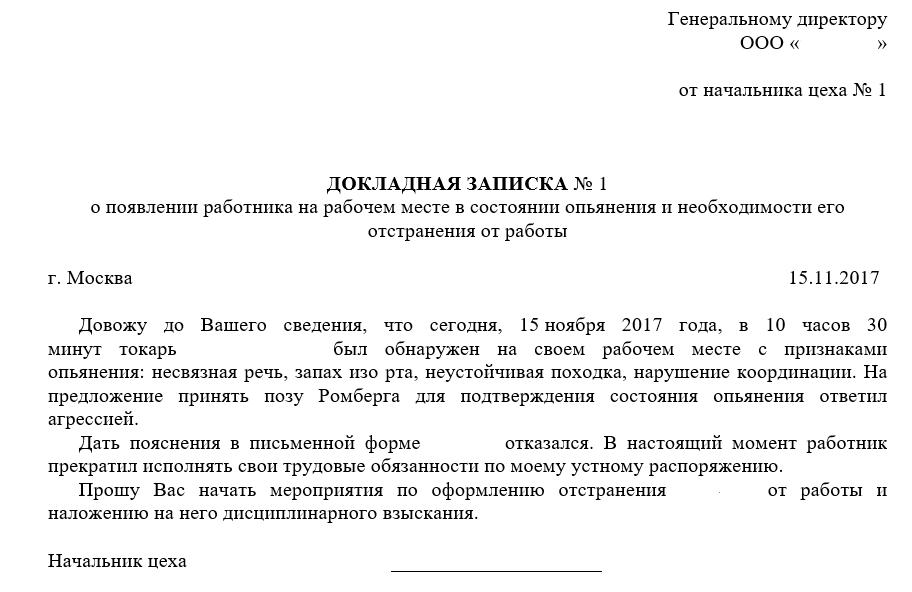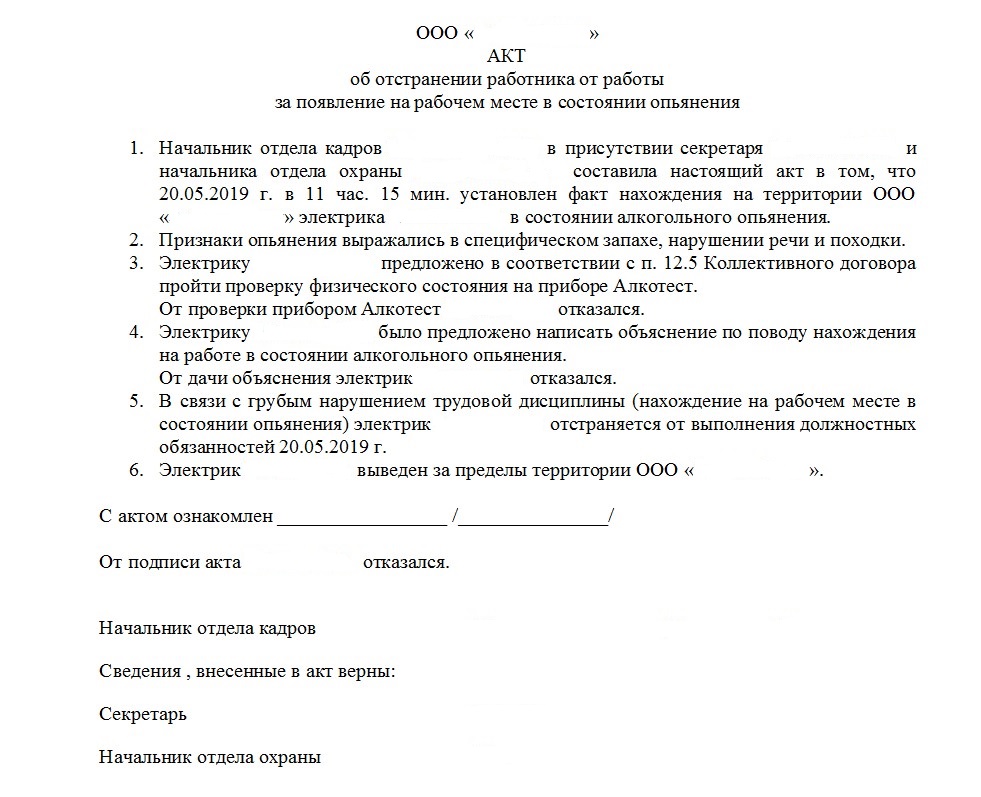Suspension from work is represented by a situation in which, for various reasons, an employee cannot begin his immediate duties in the company. There really must be good reasons for this, listed in Art. 76 shopping mall. This procedure will certainly be correctly executed, for which the employer issues an appropriate order. Most often, removal is required in a situation where the employee comes to work in a state of intoxication, which can be alcoholic or narcotic. For such an offense, a citizen can not only be removed from work, but also dismissed.
The concept of suspension
According to Art. 76 TC temporary suspension from work must be carried out by the head of the company in the correct sequence of actions. This procedure does not involve termination of employment or amending an employment contract.
Temporary suspension is often applied in order not to legally pay employee salaries. If there is no employee fault, then this situation is called downtime, so its payment is made on the basis of Art. 157 shopping mall.
Prevention of work is considered a forced and last resort, applied only if there are really significant reasons.

Suspension Rules
The decision to prevent an employee from working is taken not only by the direct employer, but also by the court or other government bodies. Suspension rules depend on the reason for applying this process. General rules include:
- all circumstances under which this extreme measure is applied should be recorded in official documents;
- documentary evidence is usually a special act of exemption of an employee from labor activity;
- this act prescribes all the information about the employee, as well as the reasons for applying this punishment;
- the decision to dismiss is invariably formalized by issuing an order by the head.
The order must have a reference to Art. 76 of the Labor Code of the Russian Federation, otherwise it will not have legal force. If the employee believes that the employer is removing him from work illegally, he can challenge this decision, for which he will have to go to court with a lawsuit. Moreover, he must have evidence of unlawful actions on the part of the employer.

Reasons for applying the procedure
Suspension is used only for good reason. These include the following violations:
- The employee appears at work in a state of intoxication or under the influence of drugs.
- For various reasons, a citizen could not get training.
- He does not have the necessary knowledge about labor protection at the enterprise.
- The employee does not have a certificate confirming that he underwent a mandatory physical examination or psychiatric examination, therefore, he cannot be allowed to perform certain labor duties.
- A citizen was deprived of a license, on the basis of which he carried out labor activities.
- A special right, such as a driver’s license, is about to expire, so a citizen who works as a driver cannot be allowed to work.
- A medical commission report was received containing information on the deterioration of a citizen’s health, so he cannot be allowed to perform specific duties.
- The procedure is carried out on the basis of a decision of the court or law enforcement agencies.
Any reason must be fixed in an order issued by the employer.Most often, the suspension from work is connected with the fact that the employee comes into the company while intoxicated.
Medical indications
Often, employees have to be denied access to work after they undergo a medical examination. Many companies often require compulsory medical examinations, the results of which show whether a particular specialist can carry out labor activities in a certain direction. For medical reasons, suspension may be due to the following reasons:
- the employee is intoxicated, therefore, simply can’t start his duties;
- according to the results of the inspection, it is established that he cannot work in a specific area of activity;
- contraindications for work are found after visiting a doctor.
Based on these reasons, the employer requires the employee to stop working. If dismissal is not required, then the citizen will be able to begin his work only after the violation has been eliminated. If it is impossible to eliminate the cause due to the poor state of health of a citizen, then the employee is transferred to a new job or dismissal under art. 81 shopping mall.

According to labor safety standards
Each specialist can be allowed to work only after passing a briefing on labor protection standards. For this, special training is organized, after which the employee must pass a test that determines how well he has learned the material.
If the results of the audit are unsatisfactory, then the citizen is not allowed to further work. If, for various reasons, he cannot get admission, then he quits.
By decision of the court or government
Based on Art. 76 of the Labor Code, not only the head of the company, but also various state institutions can remove any employee from work. For this, a special prescription is drawn up, and it is issued by the following organizations:
- Labour Inspectorate;
- SES;
- fire inspection;
- prosecutor's office;
- court.
Usually, the need to complete this process arises after conducting an audit at the company.

Clearance procedure
According to Art. 76 of the Labor Code of the Russian Federation, the removal of any employee from work must be properly executed. To do this, an order is certainly issued, and it is necessary to rely on documents confirming that the citizen really can not cope with his duties.
The most commonly used documents are:
- results of a medical examination of drivers or other hired specialists;
- medical examination report confirming that the employee is truly intoxicated;
- the act on the removal of the employee, since he does not have permits or a certificate of passing a test for knowledge in the field of labor protection;
- other documents that confirm that for one reason or another the employee cannot fulfill his duties.
Most often, the suspension is due to the fact that a citizen comes to work while intoxicated. A drunk worker cannot be allowed to use various equipment or communicate with customers. This condition is usually detected by the security guard or immediate superior, after which a memorandum is compiled, a sample of which is located below.

Drawing up an act
Based on Art. 76 TC it is important to correctly execute the removal of a citizen from work. For this, an act is formed in which the following information is available:
- reason for the procedure;
- persons involved in registration;
- term of suspension;
- Date of document formation.
If the reason is the result of a medical examination of the driver, then the details of the available conclusion are indicated. A sample act can be studied below.

Rules for issuing an order
If a decision is made to prevent a specific specialist from working, the employer will certainly issue an appropriate order.The following information is entered into it:
- personal data about the employee submitted by his full name, position held and the department in which he operates;
- the period for which he is relieved of work;
- reason for making such a decision;
- reference to other documents that serve as the basis for the issuance of the order;
- the procedure for paying for downtime, which depends on the reason for its occurrence;
- date of document formation;
- signature of the head;
- a line is left for the signature of the direct employee.
The document must be handed over to the employee for signature. If a citizen refuses to sign, then the relevant information is indicated in the document. This certainly requires the presence of two witnesses.
Term of Suspension
The term for which a person is suspended from work depends on the reason for this action. If it is possible to eliminate the detected violation, the suspension period ends at the time the reason ceases. For example, if the reason is that the driver did not pass the medical examination, then after receiving a medical report in which there are no indicated significant health problems, admission to work resumes.
If serious diseases are detected, the employee is transferred to another job or quits.
What are the benefits assigned?
Downtime days are only paid if there is no employee fault. In this case, he is assigned 2/3 of the average earnings on the basis of Art. 157 shopping mall.
If an employee came to work in a state of drug intoxication or through his own fault did not pass a medical examination, then he will not be able to receive payment for all the days during which he was suspended from work. Sometimes he is fired on the initiative of the head of the company. This happens if after the examination it is established that the citizen came to work in a drunken state.
What information is reflected in the report card?
Special notes must be entered in the time sheet that a specific specialist in a certain period of time did not engage in his labor duties. For this, the following notation applies:
- NB - if no salary is accrued for the entire period of inactivity.
- BUT - if the citizen retains his salary in full.
- PV - is used for involuntary absenteeism, during which missed days are paid by the employer.
Regardless of the reason for the removal, employers must understand the rules for registration of such a situation, otherwise they may be held accountable. The grounds must be valid and supported by official documents.

Employer Responsibility for Unlawful Suspension
Often, company leaders simply do not want to pay employees a certain period of time, therefore, without good reason, they remove citizens from work. Under such conditions, employees may appeal to the labor inspectorate or prosecutor's office. Based on the inspection, all violations are revealed for which they are punished in various ways:
- officials pay a fine, and if a violation is revealed repeatedly, then this threatens disqualification;
- the company pays a fine of up to 100 thousand rubles;
- material compensation is paid to the employee;
- for the entire period of removal of a citizen from work, he is paid a salary in the amount of average earnings.
If a citizen files a lawsuit in court, he can count on receiving compensation for the moral damage caused.
Conclusion
The removal of any employee from work should be based on good reasons. For this, the employer must issue an appropriate order, and a special act is also being formed.
If the head of the company illegally removes the employee from work, this is the basis for bringing him to administrative responsibility.
